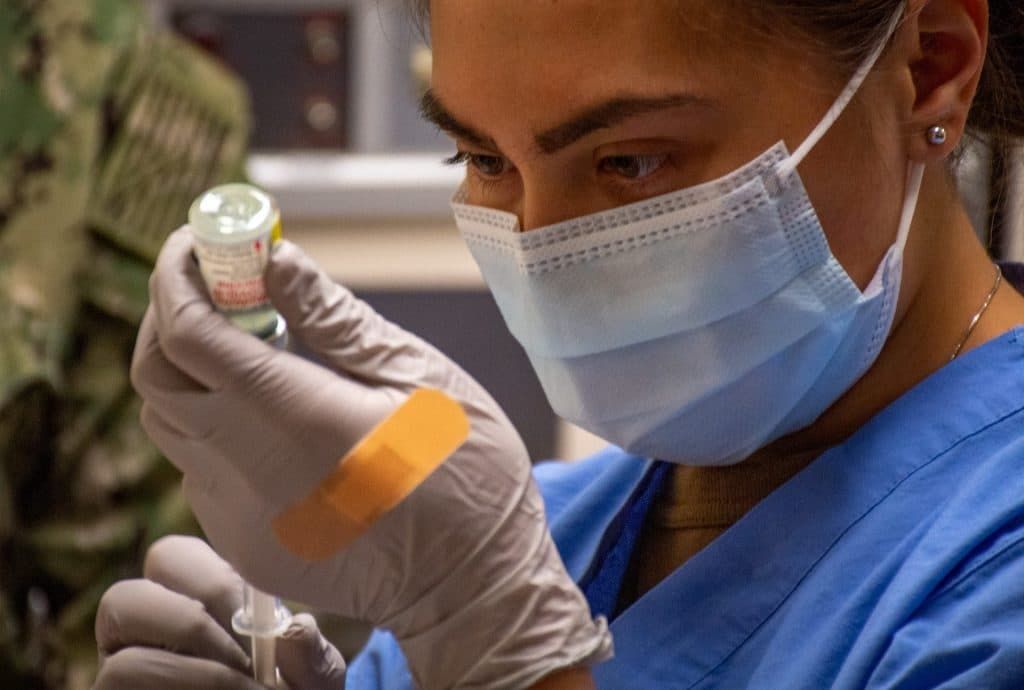Third time’s the charm? Vital questions about the White House’s COVID-19 vaccine plan
By Matt Field | August 18, 2021
 A health care worker prepares a COVID-19 vaccine. Credit US Navy. CC BY 2.0.
A health care worker prepares a COVID-19 vaccine. Credit US Navy. CC BY 2.0.
Last week, US officials unveiled a plan to offer booster shots to people whose immune system never mounted a strong response to COVID-19 vaccines to begin with. On Wednesday they previewed the much more controversial idea of giving booster shots to all adults, regardless of whether they are immunocompromised. Israel is already giving boosters to adults; some European countries have announced similar plans. But boosters will be rolled out while many people in the world are unable to get their first shots. The head of the World Health Organization (WHO) has said 80 percent of the four billion shots administered so far have gone to wealthier countries, where less than half the world’s population lives. US officials, however, point to data suggesting that breakthrough infections in vaccinated people leading to serious disease could start to tick up.
Should the United States be sending those boosters overseas?
WHO official Michael Ryan compared giving booster shots to handing out life jackets to people already wearing them. The WHO has called for a moratorium on booster shots as it tries to close the vast chasm in vaccination rates between wealthy and lower-income countries. But White House officials have argued that administering boosters wouldn’t detract from efforts to send vaccines abroad. At Wednesday’s press conference, Jeff Zients, a top White House official in charge of COVID-19 response, cited statistics to suggest that the United States donates twice as many doses as it uses. In June and July, he said, the country administered 50 million shots. So far, he said, the United States has donated 115 million shots. And this fall, he said, when the administration expects that 100 million booster shots will be administered, the country will donate 200 million more abroad. But a booster administered domestically is arguably a dose that could be sent overseas, rosy statistics aside.
Why now?
Administration officials are walking a tight rope. They want to instill trust in the vaccine, emphasizing that the shots remain effective at protecting against severe disease, but at the same time signal the need for boosters. Officials said boosters would be available beginning on September 20 and people would receive them eight months after their last dose.
Centers for Disease Control and Prevention (CDC) Director Rochelle Walensky cited three studies Wednesday that officials see as warning signs. “The data consistently demonstrate a reduction of vaccine effectiveness against infection over time. Importantly, though, despite waning vaccine effectiveness against infection, data analyzed through July continued to demonstrate the stable and highly effective protection against severe illness and hospitalization for people who are vaccinated.”
Surgeon General Vivek Murthy said that if the United States follows the trajectory outlined in the studies, even the vaccine’s protection against severe illness could deteriorate. “We likely see in the future an increase in breakthrough hospitalizations and breakthrough deaths…That’s why we used our judgment…to see when to make a determination of what that point may be. And that’s how we came to the eight-month mark.”
Why get ahead of the Food and Drug Administration (FDA)?
In the lead-up to the 2020 election, experts worried that the former Trump administration would pressure the FDA to rush vaccines through to approval; many worried that the agency would push for authorizing a vaccine on a political schedule rather than that demanded by thorough clinical trials. Now the Biden administration has weighed in on the need for booster vaccines and unveiled a detailed plan, all before the experts at the FDA have publicly weighed in on the data. It sure would be awkward for the agency to decide against boosters now, even though some health experts question their importance.
But Murthy said “we are not skipping the very important FDA and [CDC advisory committee] process here. They have an incredibly important role to play in evaluating safety and making recommendations for vaccines.” He said, a plan to administer shots to tens of millions of people is a complicated matter. “you can’t turn on a booster effort with the flip of a switch.”
Will boosters stop transmission?
Infection rates have skyrocketed in the United States in the face of the delta variant, and the seven-day rolling average for daily cases stood 140,000 on Wednesday, according to The New York Times. Some research suggests vaccinated people could be contributing to the spread of COVID-19 and be harboring substantial amounts of virus in their noses.
Optimism that the vaccines were effective against transmission led the CDC to issue guidance in May that vaccinated people didn’t need to mask up. The agency has since reversed its position and mask mandates are now being implemented by local governments in many places.
Anthony Fauci, the director of the National Institute of Allergy and Infectious Diseases, was optimistic that the big boost in antibodies to SARS-CoV-2, the virus that causes COVID-19, that occur after a booster shot could help thwart transmission from vaccinated people.
“Transmissibility is a bit more tricky than looking at a clinical phenomenon such as infections, seriousness of disease and hospitalization,” Fauci said Wednesday. “It is conceivable that [high antibody levels] would be important in lowering the level of the virus in the nasopharynx which could have an impact on transmission. I certainly hope that’s the case.”
Despite initiating a booster program, highly vaccinated Israel is still dealing with a surge in cases caused by the delta variant
Together, we make the world safer.
The Bulletin elevates expert voices above the noise. But as an independent nonprofit organization, our operations depend on the support of readers like you. Help us continue to deliver quality journalism that holds leaders accountable. Your support of our work at any level is important. In return, we promise our coverage will be understandable, influential, vigilant, solution-oriented, and fair-minded. Together we can make a difference.
Keywords: COVID-19, booster shots, vaccines
Topics: Biosecurity, Disruptive Technologies















Most of the country had never heard of Dr. Fauci until the coronavirus, but my parents – both of whom worked in the medical profession – had known of him for years. My mom even attended a conference where Fauci gave a speech.
The FDA can do us all a favor and approve ivermectin and hydroxychloroquinine and other drugs that have shown promise. Interesting how there is not much said about Remdesivir of late. Approving a new vaccine (gene therapy platform) without going through the appropriate and need clinical trials is rather unprecedented for anyone who has practiced public health. Dr. Fauci in my humble opinion has some explaining to do on his involvement, connections and funding of gain of function research that produced this scrounge upon our society. Subjecting individuals to an experimental drug, despite the recent approval without disclosing the the… Read more »